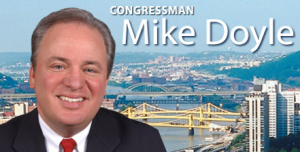 Yesterday 28 members of the House of Representatives, led by Rep. Mike Doyle (D-PA), sent a letter to FCC Chairman Julius Genachowski [PDF] urging the Commission to ensure there is space reserved in urban areas for new low-power FM station licenses. They observe that the nation’s largest urban markets “have lacked access to new noncommercial stations for decades.”
Yesterday 28 members of the House of Representatives, led by Rep. Mike Doyle (D-PA), sent a letter to FCC Chairman Julius Genachowski [PDF] urging the Commission to ensure there is space reserved in urban areas for new low-power FM station licenses. They observe that the nation’s largest urban markets “have lacked access to new noncommercial stations for decades.”
In a statement, Congressman Doyle said,
“The benefits of low power FM radio have been demonstrated time and time again. These stations have been instrumental in local news reporting, emergency response, and cultural enrichment. I hope the FCC will recognize these important values so that many more Americans, in Pittsburgh and all other cities and towns, can enjoy the richness of local radio.”
The 28 House members also urged the Commission “to ensure the licenses are awarded to truly local churches, non-profit organizations, local governments and schools.” Given that local ownership is strictly required by FCC for LPFM licenses one has to wonder if this isn’t a bit of a swipe at the networks of translators piping in distinctly non-local and distant signals which compete with LPFMs for space on the dial.
The deadline to comment on the FCC’s rulemaking on pending translator applications and the implementation of the Local Community Radio Act was Tuesday, September 6.
The National Association of Broadcasters slipped its comments [PDF] in Tuesday just under the wire, pretty much urging the FCC to reduce the priority of licensing LPFM stations in the most densely populated urban cores, while asking the Commission to process and license as many translator stations as possible before moving on to opening up LPFM licensing windows. In particular the NAB suggests the FCC rely on Arbitron markets for determining the availability of LPFM frequencies, rather than the currently proposed method which focuses on keeping frequencies available inside a city’s urban core. Using an Arbitron market as the geographical measure, the requisite number of LPFM-eligible frequencies may remain available, however they could be only on the fringes, unable to serve the city centers that were a priority for many of the Congresspeople who supported the Local Community Radio Act.
The Commission is now accepting replies to comments that have been submitted. This is when the sparks really start to fly, as LPFM advocates attack the NAB’s counter-proposal, and the groups hoping for new translator licenses return the favor. The deadline to submit these reply comments is September 20.


